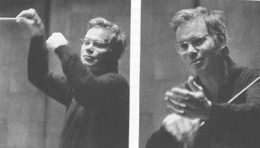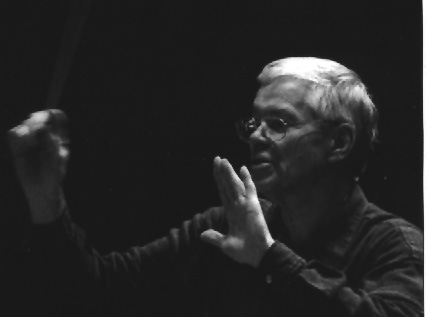|
Dietrich Fischer-Dieskau's interest in conducting began when
he was a child, and he studied conducting along with singing.
However, he didn't appear professionally as a conductor until
midway in his career.
In 1973 Fischer-Dieskau was invited to substitute for Otto
Klemperer in a recording for EMI. In the same year he made his
concert debut as a conductor with the Camerata Academica Salzburg
in Austria. Thereafter, he appeared as conductor with many well-known
orchestras in Germany, Israel, the U.K., and the U.S.A. and made
a number of recordings before he gave up conducting in September
1976.

After he ended his singing career at the beginning of 1993,
Fischer-Dieskau resumed his activity as a conductor. Since then,
he has led several well-known orchestras in a number of notable
performances, including Schubert's "Lazarus," and Mahler's
"Das Lied von der Erde". He has also continued to record,
although most of the post-1993 recordings have been as "accompanist"
to his wife, Julia Varady. So far, two recordings of Verdi arias
have been released, as well as one of arias by Richard Strauss,
and two of songs, arias, and duets by Richard Wagner. In addition,
Fischer-Dieskau has recorded a collection of rarely-heard orchestral
works bu Hugo Wolf for EMI.
Why was Fischer-Dieskau drawn to conducting in the first place? It was,
as he explained to an American journalist, a desire to make music in
its broadest sense. Many critics have remarked that his approach to
conducting is similar to his approach to singing-- serious, sensitive,
detailed, and not given to grand gestures for their own sake. Naturally,
the singer who conducts (and thereby steps beyond the boundaries of
his "speciality") is greeted with a good deal of skepticism
by the critics, and perhaps by the public, as well. But several of Fischer-Dieskau's
early recordings, his
with Josef Suk in Prague
Schubert "Fifth Symphony," Berlioz "Harold in Italy,"
and Brahms "Fourth Symphony" in particular, have achieved
a kind of cult status among record collectors. And the recordings he
has made since his retirement from singing have been very well received
and given the kind of critical evaluation reserved for "serious"
conductors.
Comments and Opinions
"The contemporary 'coffee-cup-conductors' always say
that if they rehearse everything well, then everything works
well on the evening of the concert. I find that boring. It wasn't
like that earlier; back then there was a period of time when
people said: we won't rehearse at all so that the interpretation
will remain fresh. Then people started to rehearse, but at the
concert the conductor still faced the challenge of achieving
with his eyes and gestures something that hadn't existed up until
then. And that was clearly the case with Wilhelm Furtwängler.
He was able to transform the orchestra and the audience during
a performance-- and that is the objective of a concert."
(Dietrich Fischer-Dieskau, responding to the question: "What
is a great conductor?")

"I have seldom felt more anxious about a recording than
on the morning of Fischer-Dieskau's first session. I was not
worried about whether he would acquit himself creditably; he
would never have accepted an assignment which he did not believe
he could carry out. I wanted him not merely to go through the
sessions and make a record, but to get memorable performances
of the two works. Very few people had lived so closely, for so
long, with the composer's lieder; I wanted Fischer-Dieskau's
Schubert symphonies to be as characteristic of him as his Schubert
lieder.
I am positive that none of the anxiety I felt showed obviously
when he arrived at the studio and I met him at the front door,
but that queer telepathic communication must have been working
again, for after a few moments Fischer-Dieskau looked at me,
suddenly smiled and said, "Don't worry about the recording,
Suvi-- if the first session is a disaster, I shall fly back to
Berlin this evening." I stoutly maintained that I was not
worried, and now that the actual moment had arrived, I really
was not. When I presented Fischer-Dieskau to the New Philharmonia
they greeted him with the prolonged and enthusiastic applause
orchestras reserve for musicians they respect.
Within a quarter of an hour I realized just what it meant
to have an orchestra on the side of a conductor. Fischer-Dieskau's
conducting technique was just about adequate. How could it have
been otherwise, for until the beginning of the session he had
not stood in front of an orchestra and conducted it; any rehearsing
he might have done could only have been in private, and perhaps
in front of a mirror. His gestures were sometimes ambiguous and
his instructions to this or that section of the orchestra were
not always precise. But none of this mattered-- the orchestra
sensed that he had a clear conception of the 'Unfinished' Symphony
and he was able to transmit it to every member of the orchestra.
The leader, Desmond Bradley, was a tower of strength, acting,
when required, as an interpreter between Fischer-Dieskau and
the orchestra, and everyone responded. By the time the break
came I knew that this was going to be a very special Schubert
B minor. As the leader of the cellos put it, "He's made
me play the second theme exactly as he might have sung it."
(Suvi Raj Grubb, Music-Makers on Record) |

